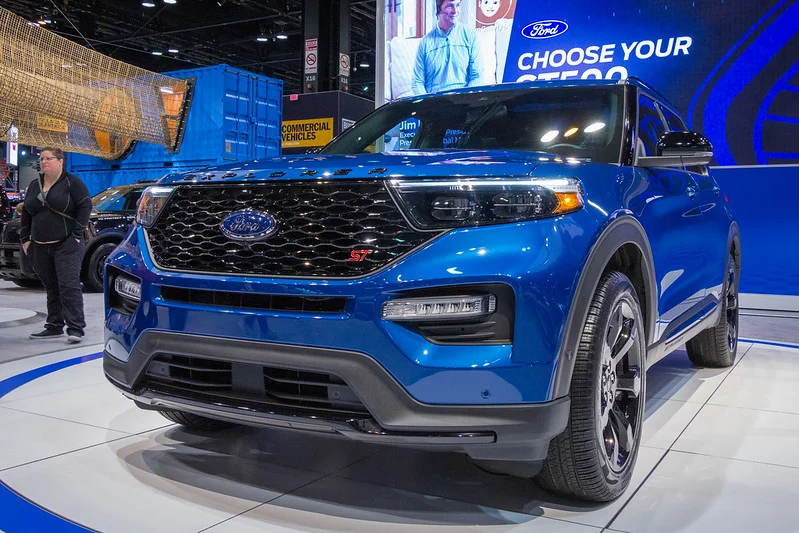2020 Ford Explorer Reliability: What To Know Before Investing In Your Purchase

Source: Flickr
The Ford Explorer gets credit for helping launch America’s SUV craze. Debuting in 1991, the Explorer offers an ideal combination of utility and drivability. The 2020 edition is the launch of the sixth generation, which saw a return to a rear-wheel-drive-based platform (the fifth generation was front-wheel-drive-oriented). The debut of a new vehicle generation can bring numerous first-year gremlins. With numerous recalls, the 2020 Explorer proves this point. So, examining 2020 Ford Explorer reliability is essential.
We’ll uncover all the crucial details by examining ratings from organizations like Consumer Reports. In addition, we’ll look at maintenance costs to get a better idea of what expenses owners face. Finally, reviewing National Highway Traffic Safety Administration (NHTSA) data provides vital insights into trouble areas and recalls for the 2020 Ford Explorer.
2020 Ford Explorer Reliability: Ratings
Ratings for the 2020 Explorer don’t start well with Consumer Reports (CR). The organization tags this Ford SUV with its lowest reliability rating: a 1 out of 5. CR points to the powertrain (the engine, transmission, drive axles, and differentials) as the central trouble spot. That’s not very encouraging.
While J.D. Power’s ratings tend to be more positive, it gives the 2020 Explorer a 61 out of 100 for “Quality & Reliability.” This “fair” rating reinforces that this Ford is far from trouble-free. In contrast, the 2020 Toyota Highlander gets a “Great” rating of 86. J.D. Power determines vehicle quality and reliability by measuring defects across new models. Higher scores indicate fewer issues reported by owners regarding the engine, transmission, electronics, and other components.
FEEL SECURE IN THE CAR YOU CHOOSE
You don’t want to buy a car - you want to get the best deal on the car you’re looking for. The CoPilot app will notify you if there’s a similar vehicle in your area at a better price, so you’re always certain you got the best deal available.
Owner feedback about reliability on the Kelley Blue Book (KBB) website shows a mid-tier rating. The 2020 Explorer’s 3.5 (out of 5.0) score falls behind the 2020 Toyota Highlander (4.2) and 2020 Honda Pilot (3.7)
All these ratings don’t bode well for 2020 Ford Explorer reliability. This family utility gets average grades at best, but several review outfits point to troubled dependability. It’s always best to cautiously approach any pre-owned vehicle purchase, but extra attention is required with the 2020 Ford Explorer. Always have any used car under consideration undergo a comprehensive pre-purchase inspection by a professional technician.
2020 Ford Explorer Reliability: Maintenance & Repair
Maintenance is essential for every vehicle. However, these tasks will cost more for owners of a 2020 Explorer. Repairpal.com reports that maintaining one of these Fords requires an annual outlay of $732, 28% more than the $573 average among all midsized SUVs.
2020 Ford Explorer Reliability: Trouble Areas
Most cars sold in the U.S. are accompanied by owner complaints submitted to NHTSA; the Explorer is no different. But what’s especially eye-opening is the number of reports on file. As of this writing, the government has recorded 524 owner complaints about the 2020 model year—a very high amount. The most common trouble areas are:
- Engine and/or powertrain (246)
- Electrical system (95)
- Back-over prevention (84)
- Service brakes (59)
- Forward collision avoidance (33)
Seeing that almost half the reported problems are engine- or powertrain-related is especially worrisome. It clearly indicates that 2020 Ford Explorer reliability is far from perfect. The high number of electric system issues is also troubling.
FORD EXPLORER PROS & CONS
If you’re interested in the Explorer, it’s critical to look at all aspects before buying. You might wonder - what are some prominent Ford Explorer pros and cons?
2020 Ford Explorer Reliability: Recalls
Recalls are a fact of life with modern automobiles, but seeing 19 recalls in effect for the 2020 Ford Explorer is shocking. Of course, not every recall impacts reliability, but the sheer number of these problems points to significant build quality issues. Whether you own a 2020 Ford Explorer or are thinking of buying one, visit the NHTSA website to get the recall status of any vehicle.
Here’s an overview of the recalls currently in force for the 2020 Ford Explorer. More information is available at any Ford dealer or the Ford owner support website.
- Vehicle Rollaway from Driveshaft Disconnect (October 6, 2023, NHTSA Campaign Number: 23V675000): Ford recalled vehicles due to a risk of vehicle rollaway or loss of drive power caused by a disconnected driveshaft.
- High Voltage Battery May Short Circuit (September 8, 2023, NHTSA Campaign Number: 23V626000): This recall addresses a manufacturing defect in the high voltage battery cells that could lead to internal short circuits and battery failure, increasing the risk of crash or fire.
- Rearview Camera Image May Not Display (May 12, 2023, NHTSA Campaign Number: 23V342000): Ford issued a recall due to the failure of the rearview camera image display, which could reduce rear visibility and increase the risk of a crash.
- Rearview Image May Not Display (April 28, 2023, NHTSA Campaign Number: 23V305000): This recall was initiated because the rearview camera did not display an image, reducing rear visibility and increasing crash risk.
- Incomplete PCM Update May Result in Rollaway (March 24, 2023, NHTSA Campaign Number: 23V199000): The recall was due to an incomplete PCM (powertrain control module) update that could lead to vehicle rollaway or loss of drive power, increasing crash risk.
- Unintended PCM Reset May Cause Vehicle Rollaway (February 10, 2023, NHTSA Campaign Number: 23V069000): Addressing the risk of vehicle rollaway due to an unintentional PCM (powertrain control module) reset.
- Rearview Camera Image May Not Display (January 23, 2023, NHTSA Campaign Number: 23V022000): Similar to other recalls, this one also concerns the failure of the rearview camera image display, increasing the risk of a crash.
- Rearview Camera Image May Not Display (September 22, 2021, NHTSA Campaign Number: 21V735000): The issue involves the potential failure of a camera image display, which can prevent the rearview camera image from displaying.
- Rear Lower Control Arm Bolts May Break (March 10, 2021, NHTSA Campaign Number: 21V154000): This recall was due to the risk of broken rear lower control arm bolts, which could cause a loss of steering control.
- Motor Mount Fasteners May Loosen Over Time (December 17, 2020, NHTSA Campaign Number: 20V788000): Addressing the crash risk due to loosened motor mount fasteners.
- Fuel Tank Inlet Check Valve Not Welded Properly (November 24, 2020, NHTSA Campaign Number: 20V730000): This recall was due to an incomplete weld on the fuel tank inlet check valve, increasing the fire risk.
- Drive Shaft May Fracture on Weld Seam (November 10, 2020, NHTSA Campaign Number: 20V693000): Ford recalled vehicles due to defective drive shafts that could fail, leading to a car rollaway or loss of drive and potentially causing a crash or fire.
- Distorted or Inoperative Rearview Camera (September 23, 2020, NHTSA Campaign Number: 20V575000): This recall was initiated due to a poor electrical connection, causing a blank or distorted rearview camera image.
- Rear Center Seat Belt Not Secured Properly (September 10, 2020, NHTSA Campaign Number: 20V549000): This recall addresses the risk of injury from improperly secured seat belt buckles.
- Side Air Bag May be Loose in Seat Back (August 21, 2020, NHTSA Campaign Number: 20V497000): The recall was due to the risk of injury from improperly tightened side airbag or seat back module attachments.
- Fuel Lines May Chafe Together Causing Fuel Leak (December 4, 2019, NHTSA Campaign Number: 19V859000): Addressing the risk of a fire from fuel line chafing,
- Wiring Harness May Contact A/C Pulley or Belt (September 30, 2019, NHTSA Campaign Number: 19V687000): This recall was due to the risk of a fire from the wiring harness contacting the A/C pulley.
- Reduced Seat Back Strength (August 28, 2019, NHTSA Campaign Number: 19V633000): Ford initiated this recall due to improperly assembled recliner mechanisms leading to reduced seat back strength.
- Vehicles Still in Factory Mode (August 5, 2019, NHTSA Campaign Number: 19V575000): This recall addresses the risk of a crash from vehicles being in factory mode.
AI-ASSISTED CAR SHOPPING
Never miss out on the best car, never overpay, and never get taken advantage of. Download the CoPilot app to see the magic of AI-assisted car shopping.
Get a Curated List of the Best Used Cars Near You
The CoPilot car shopping app is the easiest way to buy a car. Tell us what you’re looking for and we’ll search the inventories of every dealership in your area to make you a personalized list of the best car listings in your area.
Only looking for newer models? CoPilot Compare is the search engine for nearly-new cars. Only see cars five years or newer with low mileage — CoPilot Compare is the best way to find off-lease, early trade-in, and CPO cars.
The best part? CoPilot is built using the same technology that dealerships use to buy and sell their inventories, so we have more info on each vehicle than competitors. CoPilot doesn’t work with dealerships, so there are no sponsored posts or other shady practices — just the most info on the best cars. Check out our About Us page to see how CoPilot works.








